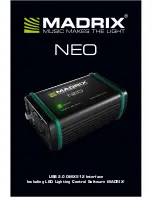
B E L 2 5 2 F u l l y A u t o m a t i c U n i f o r m C a s e T a p e S e a l e r
5
65-06-11 5/18/2007
Installing the BEL 252
Remove the through bolts that secure the machine to the base. Use wood dunnage blocks under the frame
when using a forklift to lift the machine off its shipping base and to position it.
Note: If the machine will be moved frequently, optional casters are available.
Leveling the Machine
The machine should be level to avoid frame stress and ensure optimum performance. An adjustable height
footpad kit is included as standard equipment and can be used to level the machine on an uneven floor.
The machine should be anchored to adjoining equipment or the floor to prevent any movement of the
machine by reactive forces that may occur as sealed cases are being driven through the machine outfeed.
Power Connections
Electric
The standard BEL 252 requires 120 VAC / 8A. single-phase electrical supply. The electrics are to
NEMA 12 specifications and a 1/2 horsepower TEFC motor powers the conveyor drive. A minimum
AWG 14 gauge power extension cord with standard three pin connection must be used to connect the
machine to the power source.
A dedicated electrical circuit is recommended for this machine. If any electrical connections are needed
to install the machine an electrician qualified in your jurisdiction should provide them.
Compressed Air
The BEL 252 requires an air supply that must be clean and dry, not less than 65 P.S.I. to a maximum of
120 P.S.I. with an optimal pressure of 80 P.S.I. The volume of air required for the BEL 252 is rated at
0.1 C.F./cycle at 80 P.S.I. (6 Bar). As well, the incoming air supply line must be of sufficient diameter to
provide an adequate amount of air without pressure drops when the machine is cycling, a 1/2” air line size
is recommended.
One of the most common causes of inconsistent machine performance is inadequate air supply therefore
the foregoing requirements must be carefully observed to assure satisfactory operation.
The BEL 252 is equipped with a manual compressed air on-off/dump valve, unless otherwise specified,
and a filter/regulator/lubricator, which should be checked daily to ensure the lubricator reservoir is filled,
air pressure regulated to the proper setting, and any water drained from the filter.
















































